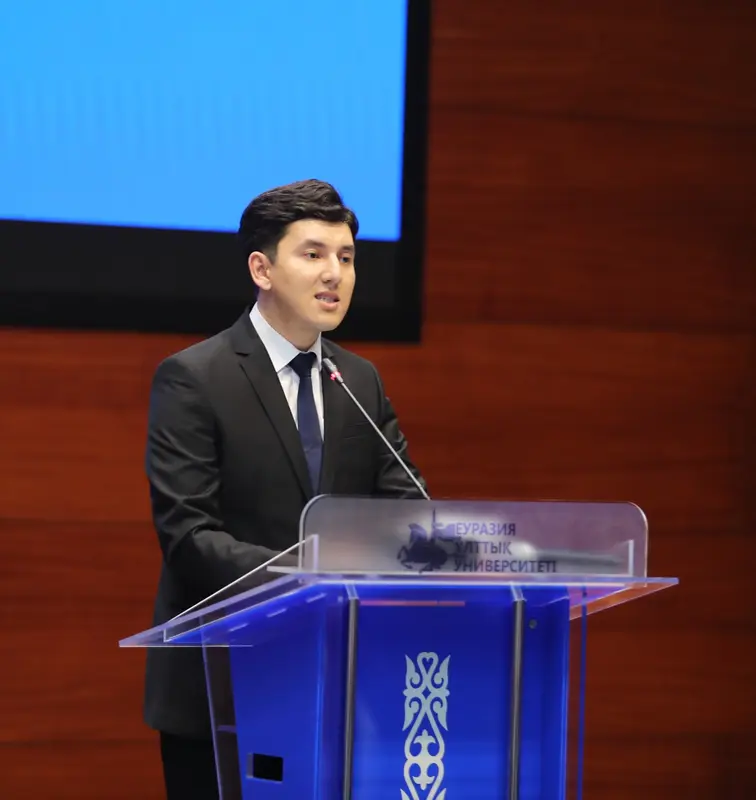Ilyas Zhumadilov, PhD, Head of the Department of Geodesy and Construction, Shakarim University: “While I speak from this podium, my university is opening new laboratories”

On April 11 in Astana, at L.N. Gumilyov Eurasian National University, the Republican Forum "Zhas Galym" was held with the participation of the Minister of Science and Higher Education, Sayasat Nurbek. One of the first speakers was Ilyas Zhumadilov, PhD, Head of the Department of Geodesy and Construction at Shakarim University.
In his speech, he emphasized that the development of science cannot wait—it is happening here and now:
“While I speak from this podium, my university is opening new laboratories, launching engineering centers, signing international agreements. We don’t live in a future tense, we live in science that is already working today.”
Shakarim University presented at the forum a living model of regional scientific breakthrough. In just the past two years, the number of young scientists under the age of 35 has quadrupled, and the volume of scientific projects has increased a hundredfold, including in applied research.
The university has established and operates:
The Laboratory of Physico-Chemical Analysis of Food Products named after K. Amirkhanov
The Laboratory of Meat Semi-finished Products
A Training and Production Workshop for the traditional Kazakh product kurt
An Agrobiological Laboratory and an Agrotechnopark
An Engineering Center and the Scientific Center for Radiological Research
By the end of April, the Department of Geodesy and Construction will open:
A Geotechnical Laboratory
A Laboratory of Building Materials
Shakarim University currently has agreements with over 60 international universities. Active dual degree programs are being implemented with universities in China, Korea, Poland, Turkey, and Uzbekistan.
276 university faculty members have a Hirsch index in Scopus and Web of Science. Vice-Rector Yerasyl Dulatbay is the only certified technical expert of CNAS in Kazakhstan. And the monitoring of building foundations using fiber-optic sensors is no longer just a laboratory project—it has reached industrial scale!
"Through education, we are forming an environment where every significant idea must be realized, where youth feels support and understands their responsibility for the country’s future," emphasized Ilyas Zhumadilov.
The speech of the young scientist from Shakarim University became one of the most substantial and inspiring at the forum, once again proving: regional science is not in the shadows—it is taking the lead.
"We don’t just want to stay updated on global processes—we must be among those who shape them, so that tomorrow, behind our research, stand real solutions, and behind those solutions—Kazakhstan," concluded Ilyas Zhumadilov.
Today, Shakarim University is a center of gravity for science, where each young researcher feels a responsibility for the nation.
And this is already resonating at the national level. The science of the future begins today.
The culmination of the I Republican Forum “Zhas Galym” was the adoption of a resolution that reflected the position of the new generation of researchers. Young scientists of Kazakhstan declared their readiness to take strategic responsibility for the development of domestic science, integration into international processes, popularization of research, and advancement of scientific solutions into the real sector.
This concerns concrete actions: over three years under the “Zhas Galym” program, hundreds of projects have been completed, dissertations defended, and commercialization of developments has begun. Proposals were made to create a Republican Association of Young Scientists and introduce quotas for international internships through the “Bolashak” program.
Ilyas Zhumadilov from Shakarim University was among those whose speech set the intellectual tone for the forum. He did not just speak on behalf of the university—he presented a systematic, dynamic, large-scale scientific process that is already shaping a new generation: researchers, engineers, and thought leaders. This generation creates science not from textbooks but in response to the demands of the times.
The forum is over, but the main question remains: what’s next?
For Shakarim University, the answer is clear. The university will continue to strengthen its research capacity, open laboratories, enhance international cooperation, and develop a generation capable not only of participating in global processes but of setting their agenda. Most importantly—it will do so not from the capital, but from the region, thus strengthening the national scientific landscape, where every university is a growth point.
It is now evident: regional science is becoming not a supplement, but a driver of national progress. And in this movement, the voice of Shakarim University is one of the strongest.
